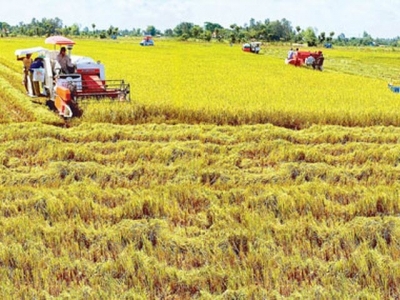Organic rice production models to affirm Vietnams export status

The Mekong Delta is one of Vietnam’s key agricultural hubs, producing masses of rice, seafood, and fruits. Currently rice production occupies 54% of the total farm land in the region, contributing more than 90% of Vietnam’s rice for export and bringing in billions of USD in revenue each year.
The agricultural sector and Can Tho City are redesigning the production areas to create large-scale organic rice fields to increase rice revenues. Can Tho now has 240,000 ha for rice cultivation, more than 70% of its agricultural production area, producing an output of 1.4 million tons. Large-scale fields make up 21% of the rice production area, in which qualified rice varieties and advanced technologies combine to create rice of high competitiveness in the domestic and international markets.
Pham Thi Minh Hieu, director of the municipal Department for Cultivation and Plant Protection, says that for the winter-spring 2017-2018 crop, Can Tho will reserve 10,000 ha for organic rice production, involving 5,400 farm families. The program aims to improve farmers’ productivity and links between cooperatives and businesses to boost sales.
“Farmers will use less input material and labor so the cost of production will drop. In addition, farmers’ health will be protected, the agricultural sector’s impact on the environment will be lessened, and profitability will increase,” Hieu added.
Economists say Vietnam is among the world’s top rice exporters in terms of output but the quality needs to be improved, pursuant to clear standards and regulations.
Vu Tiet Son, a communications consultant for the Can Tho Sustainable Agriculture Transformation (VnSAT) project, emphasized the need to give farmers more training and technology to increase the value of their rice.
He said it’s also important to develop large-scale rice fields in line with VietGap and GlobalGap standards and promote production by value chains.
“Production by value chains involves many components, including businesses. Farmers cannot sell or export their products by themselves, but must do it through enterprises. The role of businesses in this chain is to provide varieties, agricultural materials, technical solutions, and - most important - ensure farmers an outlet for their products. The link between farmers and businesses is indispensable in the rice production value chain,” Son explained.
Pham Van Quynh, former Director of the Can Tho Department of Agriculture and Rural Development, suggested that businesses set the production directions for cooperatives.
“Organic rice production must ensure safety, technical norms, farmers’ interests, environmental protection and lower production cost. Once we have so-called “safe” rice, our rice can compete in any market. Also, we need to ensure that our price is very competitive and the amount produced should match business demand,” Quynh said.
It’s predicted that Vietnam’s rice exports will face problems because importers will trace the origin of commodities and inspect the use of plant protection chemicals. So organic rice is vital for Vietnamese exporters.
Có thể bạn quan tâm
 Coffee exports target doubling to US$6 billion
Coffee exports target doubling to US$6 billion To maintain this position and increase the added value of the coffee sector, simultaneous measures must be taken to raise yields and improve coffee product
 Farming crops with rocks could reduce carbon dioxide
Farming crops with rocks could reduce carbon dioxide A new study has found that farming crops with crushed rocks could help to improve global food security and capture carbon dioxide from the atmosphere.
 Investment in high-tech agriculture growing
Investment in high-tech agriculture growing Agriculture in general and high-tech agriculture, in particular, have become attractive investment draws for domestic and foreign enterprises